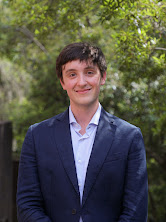Today's post is by Joseph Masotti (University of California San Diego) and Paul Conway (University of Southampton) on their recent paper, "When Do People Have an Obligation Not to Tic? Blame, Free Will, and Moral Character Judgments of People with Tourette’s Syndrome" (Neuroethics 2024).
 |
| Joseph Masotti |
Imagine being in a public space when suddenly you feel an uncontrollable urge to shout a word or sound. You know others may judge you, and you want to resist, but the urge is overpowering. If you shout, you may explain to others that the urge was just too powerful to resist. But then, others may see you acting mechanistically, lacking the control needed to be responsible for your actions. On the other hand, you can’t take responsibility for your shouting, as you know it’s not intentional. This is the reality for many with Tourette’s Syndrome (TS), a neurological disorder characterized by involuntary tics.
 |
| Paul Conway |
Our study investigates how people perceive blame, free will, and moral character in individuals with TS. Tourette's Syndrome is a neurological disorder characterized by involuntary tics, which can sometimes (though certainly not always) include socially inappropriate behaviors, such as shouting obscenities. We conducted two studies, presenting participants with a scenario regarding a man with TS who feels urges to tic, manipulating his obligation and capacity to refrain from ticcing, to explore how these factors influence perceptions of individuals with TS.
The results showed that people tend to assign more blame to individuals with TS when they are perceived as having a stronger capacity to control their tic and, to some extent, when they are perceived as having a stronger obligation to do so. This suggests that blame reactions towards people with TS may be reduced with greater public awareness, in addition to further research, on how people with TS experience their capacity (or lack thereof) to refrain from ticcing.
Participants were more likely to perceive higher free will in individuals thought to have a greater capacity to control their tics, regardless of the social context. This indicates that people associate free will with the ability to control one’s actions. The study also explored social reactions to individuals with TS. Participants expressed a greater willingness to befriend individuals and encourage them to express their tics when they believed the person had a lower capacity to control them. This suggests that increasing awareness of the uncontrollable nature of tics can lead to more positive social attitudes toward people with TS.
However, our findings, combined with related literature on the effects of explanations of mental illness on blame attributions, suggest a dilemma: while a greater understanding of the uncontrollable nature of tics in TS may reduce blame attribution, it might simultaneously lead to perceptions of lower free will since people with TS may be perceived as acting mechanistically.
This is not only an inaccurate picture of the experiences of people with TS, but it also could have adverse social effects on such individuals. To address this, we suggest that efforts to normalize tics and reduce the perceived obligation to refrain from them might help alleviate blame attribution, promoting a more inclusive and understanding attitude toward individuals with TS without portraying them as mechanistic and out of control.